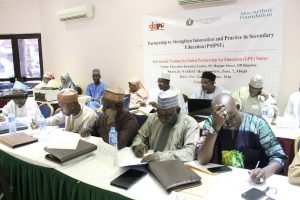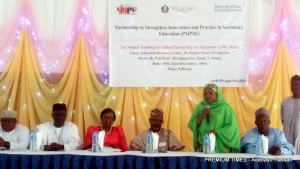Skills 4 girls 4 life is a capacity building project being implemented by the development Research and Projects Centre with the support of John D. and Catherine T. MacArthur Foundation under the Partnership to strengthen innovation and Practice in Secondary Education to strengthen the Implementation of the New Secondary School Curriculum in Girls Schools in Northern Nigeria.

The main project goal is to expand empowerment opportunities for girls in Kano and Jigawa states enter the labour force. The project objectives are: a) Strengthen commitment, leadership and skills of decision makers in Ministries of Education in Jigawa and Kano States to position life-skills subjects of the new WAEC curriculum as a central component a new girls’ education policy trust emphasizing transferable skills; b) Expand the capacity of government in-service teacher training agencies (KERD, JERD and CERC) to design and deliver training programs for teachers of civics and craft subjects skills a cost effective and sustainable manner; and c) Expand knowledge and learning of the opportunities and potential of leveraging transferable skills in the new WAEC Curriculum for empowering girls in Northern Nigeria
One of the project’s core mandate is to support the Planning and Management Systems Committees in 5 GPE/NIPEP states (Jigawa, Kano, Katsina, Kaduna and Sokoto states) to learn lessons from the PSIPSE schools and align implementation strategies between #Skills4girls4life and GPE/NIPEP project.
In furtherance of the mandate, dRPC has conducted following activities:
- 2nd Annual Training workshop- Leadership and management for Girls` Education in Global Partnership states – 19th – 22nd December 2016
The workshop was conducted by dRPC in partnership with National Institute for Policy and Strategic Studies (NIPSS) for forty (40) strategic officers from 5 GPE/NIPEP states in Nigeria which were Katsina, Kaduna, Kano, Jigawa and Sokoto states The workshop was aimed at strengthening the capacity of Global Partnership for Education (GPE) grant recipient states and to increase their ability to effectively leverage the opportunity to implement the girls’ education component.
Some of the major issues discussed at the 3-day training are:
- Gender Analysis and Girls’ education in Nigeria
- Gender Components of 2016-2019 FMoE Strategic Plan
- Curriculum reform as an empowerment tool in girls’ education
- Policy recommendations for girls’ education from the NIPSS 2015 Senior Executive Course
- Leadership in Girls Education

The workshop was effective in improving the participant’s knowledge and understanding of girl child education and how to improve GPE programs in their states. Significant progress was also made in specific aspects such as identifying problems and challenges in girl child education, gender analysis, curriculum reform, leadership in girl child education, current state of events, lessons learned and action plans. The participants felt satisfied with the outcome of the training and were looking forward to learning more in subsequent events.


